2024. November 23. Saturday
The Post Office Museum in Ópusztaszer - Ópusztaszer
 |
Address: 6767, Ópusztaszer Ópusztaszeri Emlékpark, Szoborkert 68.
Phone number: (62) 275-133, (62) 275-150
E-mail: info@postamuzeum.hu
Opening hours: 01.04-31.10.: Tue-Sun 10-18
|
Museum tickets, service costs:
|
Ticket for adults
|
750 HUF
|
|
|
Group ticket for adults
(11-20 people)
|
7500 HUF
|
|
|
Ticket for students
|
375 HUF
|
|
|
Group ticket for children
(11-30 people)
|
3750 HUF
|
|
|
Ticket for pensioners
|
375 HUF
|
|
|
Ticket for families
|
1500 HUF
|
/ family
|
The National Historic Memorial Park of Ópusztaszer hosts the Post History exhibition. The room of Female Post Masters is located in the middle room of the old Town House. The exhibition wishes to commemorate the female post masters who were among the first ones to stand up for emancipation.

From the beginning of the 19th century, the widows or their daughters inherited the office from their deceased husband or father. Women was employed at telegraph stations even in the 1860's which was enforced by a minister decree in 1869. In 1870, 72 women passed exams of telegram courses.
The display focuses on female post masters working in small villages who were the representatives of intellectuals thus they played important role in the spread of culture. Photos and documents about them, writings from them made for the Millennium are all betray their love of profession. The post families, widows and daughters kept to this profession in their entire life which did not pay well, but it provided a sure income.
Photos show the conditions of their work, their income is stated and the CV of a few of the post master women.

From the beginning of the 19th century, the widows or their daughters inherited the office from their deceased husband or father. Women was employed at telegraph stations even in the 1860's which was enforced by a minister decree in 1869. In 1870, 72 women passed exams of telegram courses.
The display focuses on female post masters working in small villages who were the representatives of intellectuals thus they played important role in the spread of culture. Photos and documents about them, writings from them made for the Millennium are all betray their love of profession. The post families, widows and daughters kept to this profession in their entire life which did not pay well, but it provided a sure income.
Photos show the conditions of their work, their income is stated and the CV of a few of the post master women.
